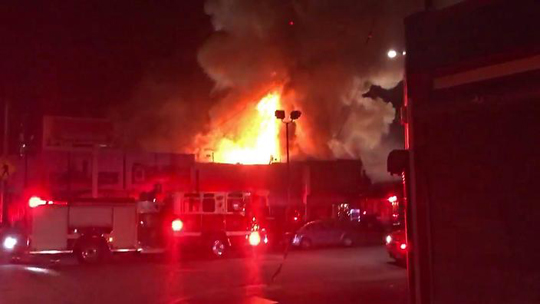Oakland, Dec 4: Up to 40 people were feared dead in a huge fire that tore through a rave party held in a warehouse near San Francisco, authorities said, warning that the initial death toll of nine would likely rise once crews swept the stricken building.

Oakland Fire Chief Teresa Deloach Reed said most of those who perished in the blaze that started about 11:30 pm (1300 IST) yesterday were thought to have died on the upper floor of the two-story warehouse known as Oakland Ghostship.
"It must have been a very fast-moving fire," she told reporters.
It was not immediately known what sparked the inferno at the electronic dance music party attended by an estimated 50 to 100 people.
By mid-day today, fire crews had not yet been able to fully sweep the scene and officials braced for more casualties once rescuers entered the building.
"We are prepared for several dozen fatalities," Sergeant Ray Kelly, of the Alameda County Sheriff's department, told reporters. "We are prepared to deal with 30, 40 deceased people."
He said some of the missing were from overseas, making identification of the victims -- thought to be in their 20s and 30s -- more difficult.
The warehouse, which housed an artist collective, had numerous partitions that had been added and a makeshift stairwell built from pallets.
Some of the structural changes made it extremely difficult for people to escape, Reed said.
"There wasn't a real entry or exit path," she said.
"I don't know where the fire started, but I do know that the way the building was situated made it difficult for people to escape."
Firefighters were hampered in their efforts to put out the blaze by clutter.
"It was filled end to end with furniture, whatnot, collections," Reed said. "It was like a maze almost."
She added that it appeared no smoke detectors were activated in the building, which also had no sprinkler system.
The fire raced through the structure quickly and got out of control at one point, forcing firefighters to pull back.
Friends and family of partygoers went to social media to try and find news about their loved ones, with some posting information on the event's Facebook page.
"Please tell me you are safe," one woman wrote, adding a friend's name, while others posted prayers.
The rave party featured a little-known act called Golden Donna and several other performers. It was unclear if any of the DJs were among the dead.
"I literally felt my skin peeling and my lungs being suffocated by smoke," Bob Mule, a photographer who lives in the building, told Fox television affiliate KTVU. "I couldn't get the fire extinguisher to work."
Another artist told the station that the fire broke out in the back of the building where some 18 artists shared space.





Comments
Add new comment